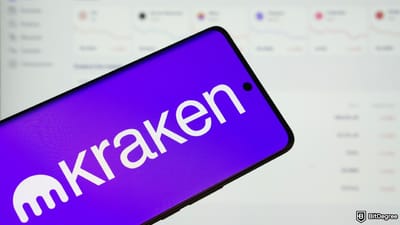Key Takeaways
- There are three main effective ways to avoid crypto restrictions in the US, including using offshore exchanges or DEXs, getting a digital residency ID or using P2P platforms;
- Non-compliance can lead to severe penalties, including fines, account restrictions, or legal action, so if you do try to bypass US crypto laws, make sure you're doing it legally;
- There are several secure American-friendly crypto exchanges, though you will usually need to pass KYC to use them.
Stop overpaying - start transferring money with Ogvio. Sign up, invite friends & grab Rewards now! 🎁
Are you tired of feeling limited by US crypto regulations, watching opportunities in the world of digital assets slip through your fingers? If so, you may have searched for how to bypass US crypto laws.
However, it's crucial to approach this with caution since any illegal or unethical methods could lead to severe consequences, including account restrictions or legal repercussions. To make sure you stay on the right side of the law, I’ll break everything down for you on how to trade crypto in restricted states legally in the USA. I'll answer some common questions, such as "Is it legal to use VPN to bypass state restrictions?".
If you’re looking for legitimate ways to trade cryptocurrency using compliant and regulated exchanges, I’ve also compiled a list of American-friendly platforms. For example, Kraken and Coinbase are some of the excellent options, and I’ll explain why they stand out and which states they support.

Did you know?
Subscribe - We publish new crypto explainer videos every week!
What is a Perpetual Contract in Crypto? (Definition + Example)


Table of Contents
- 1. 3 Ways on How to Bypass US Crypto Laws
- 1.1. Look For Offshore or Decentralized Exchanges
- 1.2. Sign Up for a Digital Residency ID
- 1.3. Use a P2P Platform
- 2. Understanding the US Crypto Laws
- 3. American-Friendly Exchanges for Navigating Crypto Restrictions
- 3.1. Kraken
- 3.2. Gemini
- 3.3. Crypto.com
- 3.4. Coinbase
- 4. Risks and Concerns When Bypassing US Crypto Laws
- 5. Conclusions
3 Ways on How to Bypass US Crypto Laws
Let's delve right into the three primary methods on how to bypass US crypto laws legally, each with its own set of advantages and drawbacks. At the end, I'll provide a table summarizing the key points of each method to help you make an informed decision.
Latest Deal Active Right Now:Look For Offshore or Decentralized Exchanges
An offshore exchange is a cryptocurrency trading platform that is based in a jurisdiction outside of the user’s home country, often in regions with more relaxed regulatory environments. Those who just started learning how to bypass US crypto laws may like this method because the process is quite similar to registering for an exchange.
One such platform that is available for US traders is BYDFi. Co-founded by Michael Hung and headquartered in Singapore, this application provides more than 400 crypto assets to trade and exchange. If you’re concerned about security, BYDFi applies AML regulations and features two-factor authentication (2FA) and cold storage.

You may also have the opportunity to trade on this platform without completing KYC if you trade exclusively with cryptocurrencies. To avoid making a fiat deposit, use a third-party payment gateway like PayPal to purchase crypto and then transfer it to your BYDFi account.
Alternatively, use a decentralized exchange (DEX). It operates on blockchain technology, enabling trading without relying on intermediaries because trades occur directly between users through smart contracts.
More importantly, there’s no entity to impose geographic restrictions or enforce KYC/AML policies as is the case on regulated centralized exchanges.
Users are not required to share personal information, and transactions are tied only to wallet addresses, which may be the best answer for anyone looking for how to trade crypto in restricted states legally in the US. DEXs also often list tokens that are not available on centralized exchanges. This also includes newly launched projects.
Among the DEX options, Uniswap can be your go-to platform for trading Ethereum-based tokens seamlessly. It offers extensive liquidity pools for a wide variety of ERC-20 tokens, like Chainlink (LINK) and Aave (AAVE). Additionally, Uniswap supports integration with popular anonymous wallets such as Coinbase Wallet and Ledger Nano X, providing ways to avoid crypto restrictions in US jurisdictions.

If you prefer Solana-based cryptocurrencies, try SushiSwap. Originally built on Ethereum, the platform has expanded to support multiple blockchains, including SOL, enabling users to trade SPL tokens natively.
In addition to trading, SushiSwap provides opportunities for yield farming, staking, and lending, allowing users to maximize their earnings while participating in the Solana ecosystem.
However, it’s important to consider the potential risks associated with using decentralized exchanges. Unlike centralized ones, DEXs usually don't offer customer support or account recovery services, meaning users must securely manage their private keys and wallets. If a transaction fails or funds are sent to the wrong address, recovery is typically impossible.
While platforms like Uniswap and SushiSwap are reputable, the decentralized nature of DEXs allows anyone to create token pairs, which increases the risk of encountering scams or fraudulent projects. Users should always verify contract addresses and conduct thorough research before trading or providing liquidity.
Sign Up for a Digital Residency ID
A digital residency ID is an innovative concept offered by certain governments or organizations, allowing individuals to establish a virtual residency in a specific jurisdiction without being physically present.
These programs are designed to cater to digital nomads, entrepreneurs, and crypto enthusiasts seeking regulatory benefits, access to business opportunities, or improved digital services. Registering this type of ID with exchanges may free you from certain state or even federal cryptocurrency regulations.
Learning how to bypass US crypto laws using this method starts with researching jurisdictions that offer digital residency programs. One popular option is Palau’s residency ID. It is available to citizens from 138 countries, including the US.

Palau partners with RNS (Root Name System), a technology platform that provides on-chain legal identity and digital residency solutions. The cost of this ID is $248 for one year, but it’s available in the five-year and ten-year versions at $1,039 and $2,039. You can pay with most international credit cards or use your Web3 wallet for a seamless checkout since the team accepts ETH, BNB, MATIC, and other mainnet payments.
Note that a Palau digital residency ID serves as an identification document, not a certification of citizenship. Still, the ID holders can enjoy exclusive services, such as:
- Physical mailing address and mail forwarding service;
- Virtual phone number;
- e-Corporations registry.
You should also be aware of a potential drawback: registering for a Palau digital residency ID requires passing KYC and a criminal background check. As a result, the process is not fully anonymous. If you want to know how to get around KYC verification completely and maintain your privacy, this method may not be your option.
Additionally, not all cryptocurrency exchanges accept the Palau digital residency ID for verification. As of the time of writing, it is accepted by multiple platforms, including Bybit, Kraken, KuCoin, and Bitget.
If you’ve considered the pros and cons and are still interested, follow the steps below to create your Palau ID:
Step 1: Go to the official website of RNS and click the “Apply Now for $248” on the homepage.

Step 2: Sign up by entering your email address or by continuing with your Google account or Apple ID. Alternatively, you can connect using your crypto wallet (Bitcoin, Ethereum, BNB Chain, or Polygon). I chose to enter my email address, clicked "Continue", and entered the verification code sent to my inbox. After that, create a password.

Step 3: Choose your package and click "Buy Now". Next, select a payment method, read through the terms of service, click the agreement box, and then click “Place Order & Pay”.

Step 4: You should see a successful payment page. Now, proceed to the application page by pressing the “Start Application” button.

Step 5: Upload a clear and recent photo of yourself for your Palau ID. Ensure your face is centered in the frame, maintain a neutral pose, and avoid wearing hats or accessories that obstruct your face. Follow all specified requirements to ensure your photo is accepted.

Step 6: Complete the form with your personal details, including your full name, date of birth, and eye color. Then, enter a valid and accurate delivery address for receiving your physical Palau ID card.

Step 7: Upload clear front and back photos of an official identity document from your current residency. American citizens may provide an ID card, passport, residence permit, or driver’s license as valid forms of identification.

Step 8: Take a selfie following the specified guidelines. Ensure your face is fully visible within the frame, and slowly turn your head in a circular motion as prompted.

Step 9: Review all the details you’ve entered to confirm accuracy, then click the “Next” button to proceed.

Your application has been successfully submitted! After that, wait for the reviews for KYC/AML compliance, a criminal background check, sanctions and error screening to finish. The KYC process typically takes 15-20 minutes, while the application review may require approximately 5-10 business days. Additionally, production and shipping of the ID card may take an extra 2-4 weeks.
Use a P2P Platform
P2P exchanges facilitate direct trading between users without a central entity and policies[2] – some platforms even allow small transactions without requiring KYC verification. As a result, it can be a good option for those exploring strategies on how to bypass US crypto laws.
One of the no-KYC P2P platforms is Bisq. This open-source desktop application allows users to buy and sell Bitcoin on a global peer-to-peer network of individuals running the software on their own machines. Unlike traditional exchanges, it does not request personal information during trades but automatically generates a self-custody wallet and a randomized user profile for each user.

To further maintain security and manage trading limits, Bisq implements 2-of-2 multi-signature wallets and account aging, which works as follows:
- Lower-risk accounts automatically gain higher trading limits over two months without requiring account signing.
- Higher-risk accounts, especially those using major currencies or chargeback-prone payment methods in the US, must get signed by a trusted peer to start the account aging process.
The Bisq software doesn’t integrate directly with any payment methods. This is because it prioritizes minimizing chargeback risk. In the US, supported payment methods include Chase QuickPay, Popmoney, and Zelle. It also supports more unconventional options such as face-to-face trading, domestic wire transfers, Western Union, and US Postal Money Orders.
Although Bisq skips traditional KYC processes, users may need to share details about their payment methods with trading peers. If you prefer maintaining privacy, buy and sell BTC using altcoins like XMR, ETH, or LTC.
That said, check out this Bisq review if you are interested in learning how to trade crypto in restricted states legally in the US with this specific platform.
“So, from those three aforementioned ways to avoid crypto restrictions in the US, which is the best method for me?”, you might ask. The most suitable approach depends on your specific needs and risk tolerance. Also, it’s important to check what states don’t allow crypto trading using the preferred strategy you choose. To help you make an informed decision, here's a comparison of the three primary methods:
| Method | Best For | Considerations |
|---|---|---|
| Offshore or decentralized exchanges | Advanced users seeking maximum privacy and access to various cryptocurrencies | May require technical knowledge and higher risk tolerance due to less regulation and potential security risks |
| Digital residency ID | Users seeking a more formal and legal way to access crypto markets | Involves costs, potential KYC requirements, and restricted recognition in some platforms |
| P2P Platforms | Users prioritizing security and access to crypto markets the legal way | May have limited cryptocurrencies and specific payment methods |
Table: comparison of how to get around KYC verification in the US
Whatever method you choose, make sure to conduct thorough research on each option on how to bypass US crypto laws. Also, familiarize yourself with federal and state regulations and consider consulting with legal professionals who 100% understand the ins and outs of cryptocurrency laws by the state you’re living in.
Understanding the US Crypto Laws
Even though you now know the main strategies on how to bypass US crypto laws, it's important for you to understand how cryptocurrencies are regulated in the country. As of now, the regulatory landscape of crypto in the US is not clearly defined and constantly changing.
Certain government agencies have different views on digital assets, leading to inconsistent regulations. Furthermore, cryptocurrency laws by state and federal jurisdictions may vary and overlap.
For example, in Kentucky, cryptocurrency is considered a form of money. Businesses dealing with crypto must have a money transmission license to operate legally.
Additionally, Kentucky has specific regulations regarding unclaimed cryptocurrency. It also has recently introduced legislation to govern cryptocurrency mining and taxation, which may make learning how to bypass US crypto laws even more challenging.
Meanwhile, Massachusetts primarily regulates money transmission activities involving foreign countries. Unlike Kentucky, certain cryptocurrency-related activities within Massachusetts - such as processing fiat-to-crypto exchanges and providing digital wallet services - do not require a money transmission license.
Some regulatory bodies oversee the US financial markets, and one of them is called the Securities and Exchange Commission (SEC). It aims to protect investors, keep the market fair, and help businesses grow. In crypto, the SEC determines whether cryptocurrencies or tokens are securities, often using the Howey Test.
The Howey test decides if a transaction qualifies as an "investment contract" and, therefore, a security. The criteria include:
- Whether it's an investment of money;
- In a common enterprise;
- With an expectation of profit;
- Profits are derived from the efforts of others.
If deemed securities, tokens or assets must comply with strict registration, reporting, and disclosure requirements.
Americans may also be familiar with the Internal Revenue Service (IRS). The IRS treats cryptocurrencies as property for tax purposes, so gains and losses from crypto transactions are subject to capital gains taxes.
Another regulatory body involved in the US crypto laws is the Commodity Futures Trading Commission (CFTC), which oversees the trading of derivatives such as futures and options contracts related to cryptocurrencies. Platforms offering crypto derivatives must register with the CFTC and comply with its regulations, including reporting and applying anti-manipulation measures.

Talking about the latter, the US also has the Financial Crimes Enforcement Network (FinCEN). FinCEN implements anti-money laundering (AML) and counter-terrorism financing laws, requiring crypto exchanges and wallet providers to register as Money Service Businesses (MSBs) and comply with AML and Know Your Customer (KYC) procedures.
AML laws require financial institutions to monitor and report suspicious transactions to prevent illegal activities, while KYC rules mandate that businesses verify the identity of their customers to ensure regulatory compliance. That’s why crypto exchanges often require users to provide personal identification documents before trading or withdrawing funds.
Although regulations aim to protect users and ensure fair markets, many crypto platforms restrict US traders due to complex legal requirements, forcing them to learn how to bypass US crypto laws to access the market.
Overlapping and sometimes conflicting rules from the SEC, CFTC, and state agencies make compliance challenging. Moreover, differing interpretations of whether cryptocurrencies should be classified as securities, commodities, or something else further complicate matters for platform creators when developing their offerings.

Besides the uncertainties, implementing KYC procedures can be challenging. From a business perspective, KYC processes can be burdensome because they are costly, inefficient, and inconvenient for customers[1].
Some also raise privacy concerns. Exchanges operating in the US are required to collect extensive personal data, including Social Security Numbers (SSNs) and detailed transaction histories, increasing the risk of data breaches.
All of these pain points have led to a fragmented market where some platforms implement geofencing to exclude US users entirely, limiting access to innovative financial services for local residents.
Efforts to address these challenges - such as introducing clearer legislative frameworks - are underway. However, achieving consensus among lawmakers and regulatory bodies remains a significant hurdle. This might lead you to wonder, "Why go through the hassle of dealing with KYC when you can simply use a VPN?". While using a VPN for trading is technically possible, its legal status remains a gray area.
American-Friendly Exchanges for Navigating Crypto Restrictions
Navigating cryptocurrency restrictions in the US can feel tricky due to complex regulations. Therefore, instead of trying to look for ways how to bypass US crypto laws, you may want to consider exploring exchanges that let you trade legally.
Many platforms are designed specifically for US residents, following local regulations while offering secure and user-friendly services. These exchanges allow you to trade cryptocurrencies safely and stay compliant with federal and state laws without having to worry about how to get around KYC verification.
Kraken
One option is Kraken. Though I'm referring to the American-regulated version of this famous international crypto exchange platform. As you can imagine, it’s designed to comply with local regulations. However, its functionality is more limited compared to the global version, prompting users to explore ways to bypass US crypto laws for full access.
For most traders, this version provides sufficient features unless advanced capabilities are required. Users can seamlessly trade all of the most popular cryptocurrencies, including BTC, ETH, and XRP. That said, it’s important to note that staking is not available for residents of the United States.

Nonetheless, at the time of writing, it supports 47 states, such as California, Florida, Arizona, and New Jersey. What states don’t allow crypto trading using Kraken? This exchange remains unavailable for 3 areas: Washington, New York, and Maine. Some states might also have other restrictions like cash-to-cash trading. Therefore, I recommend visiting their official website for more information on specific features you’re interested in.

Did you know?
Subscribe - We publish new crypto explainer videos every week!
What is Chainlink? LINK Explained Simply (ANIMATED)


Gemini
Furthermore, residents of New York can try accessing Gemini, as it complies with cryptocurrency regulations under New York's BitLicense and the legal requirements of 49 other US jurisdictions. This means no more worrying about how to trade crypto legally in restricted areas within the US.
Moreover, this crypto exchange features a user-friendly interface, a mobile app, and support for a growing list of cryptocurrencies.
Crypto.com
If you believe that the user base reflects popularity, check out Crypto.com. When comparing Gemini VS Crypto.com, the latter boasts 100 million active users, showcasing its widespread adoption. As of now, Crypto.com is available in 49 states and US territories, including Alabama and Alaska.

- Secure and reliable
- Accepts fiat currencies
- Lots of trading options
- Reputable exchange
- Accepts fiat currencies
- Offers various trading options

- Huge trading variety
- Regulation-compliant around the globe
- Fair trading fees
- Beginner-friendly
- A wide array of features
- Vast number of different crypto coins & tokens

- Beginner-friendly
- Secure
- Decent trading and withdrawal fees
- Crypto.com Visa Card
- Automated tools & bots
- Ecosystem synergy with CRO
Coinbase
You may also be familiar with Coinbase. Based in the US and fully compliant with most of the state regulations, this platform is among the most trusted and widely used cryptocurrency exchanges. In most of the US, users can access a full suite of features, including staking options, perpetual futures, and instant transfers.
Here's a table to summarize the available options:
| Name | Description | States Supported |
|---|---|---|
| Kraken | Limited features than the global version but sufficient for most traders | 47 |
| Gemini | User-friendly interface and mobile app | 50 |
| Crypto.com | Large user base | 49 |
| Coinbase | Full suite of features | Not specified, but available in most US states |
Table: a comparison of strategies on how to bypass US crypto laws
Overall, when selecting a cryptocurrency exchange, it's crucial to consider both regulatory compliance and user experience. Kraken, Gemini, Crypto.com, and Coinbase each offer unique advantages and limitations.
For users prioritizing regulatory compliance and a user-friendly experience, Kraken, Gemini, and Coinbase are strong contenders. Meanwhile, for those seeking a broader range of trading options and a large user base, Crypto.com can be a compelling choice.
Risks and Concerns When Bypassing US Crypto Laws
KYC and AML regulations are cornerstones of the global financial system, designed to prevent money laundering, terrorist financing, and other illicit activities. Thus, always exercise caution when learning how to bypass US crypto laws (legally).
Privacy concerns, fear of regulatory scrutiny, or the desire to overcome geographic restrictions motivate some individuals to engage in risky practices - such as using fake IDs, submitting false information, or employing unauthorized methods - to access restricted platforms.
Such actions can have serious consequences. If exchanges or authorities detect suspicious or non-compliant activity, users risk having their accounts flagged, frozen, or terminated.
In addition, funds in flagged accounts often become inaccessible during investigations, potentially resulting in significant financial losses. Moreover, individuals involved in illicit activities may face severe legal penalties, including fines and imprisonment.

Another common tactic involves the use of Virtual Private Networks (VPNs) to bypass geo-restrictions on cryptocurrency platforms. A VPN creates a secure, encrypted connection to servers outside the user’s national borders. By disguising their IP address, users can appear to be accessing the internet from another country, effectively sidestepping domestic restrictions.
Is it illegal to use a VPN to bypass restrictions in the US? While not inherently illegal, this approach warrants caution. Advanced security systems employed by exchanges may detect VPN usage or mismatched location data. Ensure that you use a reputable VPN for trading and carefully review the exchange’s terms of service to avoid legal and regulatory issues.
Conclusions
In conclusion, navigating US crypto regulations can be challenging. Strict frameworks and varying state-level rules lead many popular exchanges to limit access for American traders. As a result, some individuals look for ways how to bypass US crypto laws, such as using decentralized exchanges or obtaining a digital residency ID.
Although these strategies are legal, they carry certain risks, including potential account freezes, legal consequences, or financial losses.
If you’d prefer to avoid such hazards, consider using US-compliant exchanges like Kraken or Coinbase. These platforms let you trade cryptocurrencies legally and securely while adhering to all regulatory requirements.
The content published on this website is not aimed to give any kind of financial, investment, trading, or any other form of advice. BitDegree.org does not endorse or suggest you to buy, sell or hold any kind of cryptocurrency. Before making financial investment decisions, do consult your financial advisor.
Scientific References
1. V. Schlatt, J. Sedlmeir, S. Feulner: 'Designing a Framework for Digital KYC Processes Built on Blockchain-Based Self-Sovereign Identity';
2. K. Schmück, M. Schückes, T. Gutmann, et al: 'Less Trust, More Truth: Implications and Design Choices for Business Models and Platform Ecosystems in the Age of Web3'.









